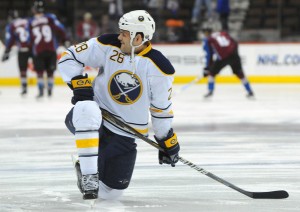The Predators did not acquire Paul Gaustad for offense, and although offense was in mind when the team traded for Filip Forsberg, whether he could produce on the NHL level had yet to be seen: until Thursday night. Gaustad and Forsberg both provided a fresh punch for the Predators offense in combined for four assists in a 3-2 victory over the Ottawa Senators in Nashville.

The third-period outburst provided all the lift Nashville needed to come from a 1-0 deficit at the end of two periods and offered the tantalizing possibility that Nashville’s offense could operate deeper than its top-six forwards this season. On a night where the off-season’s primary pickups were relatively quiet (Olli Jokinen did have a prime scoring chance late in the third), it largely fell to the makeshift fourth line to make the difference.
“They battled back, they didn’t surrender,” coach Peter Laviolette said about the third-period comeback. “They just kept pushing through, and you have to give them a lot of credit.”
Derek Roy, making his Nashville debut, assisted on the team’s first goal, which Craig Smith, the team’s leader in goals last season, scored. Then Forsberg and Gaustad happened.
Laviolette inserted the 20-year-old Forsberg on a line with the veteran Gaustad and Eric Nystrom. The Predators took the lead when Shea Weber scored what is, for him, an unorthodox goal. Rather than loading up his usual cannon from the point, he pinched in from the left point, went behind the net and stuffed home a backhander. But it was the prior sequence of events that allowed Weber the opportunity. Forsberg broke in on what became a 1-on-1 chance in which he crossed up Erik Karlsson on defense for Ottawa but couldn’t get his shot on net. Still mixed up in their own zone, the Senators appeared unprepared for Weber’s advance from the point.
The Predators then took a 3-1 advantage after Forsberg gain puck possession with a poke check in the neutral zone. Gaustad then took the puck in and hit Nystrom with a pass that left him with a nearly clean shot at the net.
The offense provided by the fourth line was most surprising probably because expectations for that group were uncertain. Nashville obtained Forsberg in the Martin Eraht deal with Washington in 2013. The Swedish first-round draft pick hadn’t yet played a game on North American soil. While he was understood to have a considerable upside offensively, he initially underwhelmed and appeared to struggle in Barry Trotz’s defense-first scheme. In 18 games between the 2013 and 2013-14 seasons, Forsberg posted 1 goal and 5 assists along with a combined minus 13 rating and was sent to Milwaukee in the American League.

The Predators paid a premium to get Gaustad, sending a first-round pick to Buffalo. At the time—February 2012—it appeared as if the team was loading up for a deep playoff run, but it wasn’t a deal that made a lot of sense for the long term. Gaustad was a third or fourth-line player, was even sometimes overlooked on deeper, more-talented Sabers teams in earlier years, and although he was an exceptional face-off man and good on penalty kills and defense, it seemed likely that Nashville landed on the wrong end of a trade-deadline bidding war.
But Gaustad, though occasionally battling injuries, has proven quite valuable. Against Ottawa, in fact, he won a late draw and frustrated Karlsson’s attempt to get a last-second shot off, settling instead for a long bomb that did not bother Predators goaltender Pekka Rinne in the least.
As for Forsberg, now is his chance to stand tall on a team with a plethora of forwards (Colin Wilson, Calle Jarnkrok, Smith), who have, in their own ways, things to prove. With a fresh season, new coach and reenergized linemates, maybe this first game is but a steppingstone.